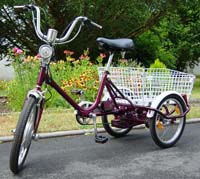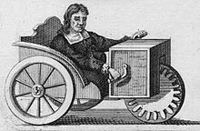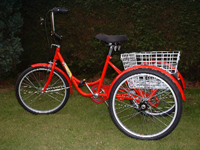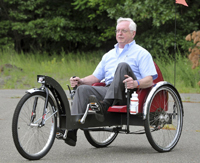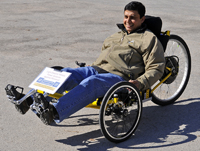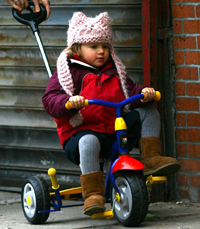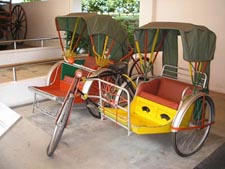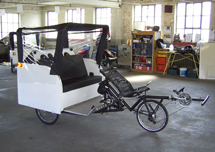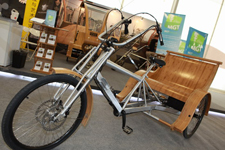
A tricycle, often abbreviated to trike, is a three-wheeled vehicle. Tricycles are used by children and adults.
| In Asia and Africa, tricycles called pedicabs are used to transport passengers; tricycles are also used to transport freight and make deliveries. In the Philippines, a tricycle is a public (for-hire), vehicle consisting of a motorcycle and an attached passenger sidecar, and should not be confused with an three wheel pedicab is known as a trisikad. | | In the United States and Canada, adult sized tricycles are used by senior adults for recreation, shopping, and exercise. Human-powered trikes are powered by pedals or hand cranks. Motorized trikes can be powered by motorcycle engines, smaller automatic transmission scooter motors, or electric motors. |
History
| | A three-wheeled wheelchair was built in 1655 or 1680 by a disabled German man; |
Types
Based on Designs
Tricycles generally are uprights, recumbent delta or tadpole. Conversion sets can alter the design of the tricycle.
| | Upright resembles a two-wheeled bicycle, traditionally diamond frame, or open frame, but with either two widely spaced wheels at the back (called delta) or two wheels at the front (called tadpole). The rider straddles the frame in both delta and tadpole configurations. Steering is through a handlebar directly connected to the front wheel via a conventional bicycle fork in delta, or via a form of Ackermann steering geometry in the case of the upright tadpole. |
| | Recumbent delta is similar to an upright, with two wheels at the back and one at the front, but has a recumbent layout in which the rider is seated in a chair-like seat. One or both rear wheels can be driven, while the front is used for steering (the usual layout). Steering is either through a linkage, with the handlebars under the seat or directly to the front wheel with a large handlebar. |
| | Recumbent tadpole or reverse trike, is a recumbent design with two steered wheels at the front and one driven wheel at the back, though one model has the front wheels driven while the rear wheel steers. Steering is either through a single handlebar linked with tie rods to the front wheels' stub axle assemblies (Indirect) or with two handlebars (rather, two half-handlebars) each bolted to a steerer tube, usually through a bicycle-type headset and connected to a stub axle assembly (Direct). The tadpole trike is often used by middle-aged or retiree-age former bicyclists who are tired of the associated pains from normal upright bikes |
| Not all trikes fall into one of these three classes. For example, some early pedal tricycles from the late 19th century used two wheels in tandem on one side and a larger driving wheel on the other. Another design is an in-line three-wheeled vehicle, with two steered wheels: one at the front and the other in the middle or at the rear. It is not unusual for tricycles to have front and rear wheels of different sizes. | |
Based on Users
Another way of categorizing tricycles is by whether they are designed for children or adults; children's tricycles and most adult tricycles made for the recreational market use the upright layout.
| From a design point of view, the difference between children's and adult tricycles is that whereas children's tricycles are usually direct drive and have no brakes, adult trikes usually have a gear-drive with multiple speeds and front and rear brakes. Children's trikes are made of steel frames or plastic. One disadvantage of plastic frames is that they are more likely to tip over than a steel frame if a heavier child is riding. On the plus side, plastic frames will not rust like steel frames if the trike is left out in the rain. Children's tricycles can also be made from bamboo. Bamboo has a tensile strength that is comparable to steel while at the same time being lightweight like a plastic frame. Bamboo can also be used to make an adult bamboo bicycle. | |
Manpower Taxi - cycle rickshaws
| | Spidertrike is a recumbent cycle rickshaw that is used in central London and is operated by Eco Chariots. The trike pictured is called the SUV (Sensible Utility Vehicle) and is produced by the company Organic Engines, which operates in Florida in the United States. A treecycle is a cycle rickshaw that is used in Shanghai and invented by Chris Trees. It has a stainless steel frame and a bamboo body. The bike pictured is the cabriolet version without roof. A notable feature is the children's safety seat as used in cars and the storage compartment below the seat. Other models feature a roof or loading deck. In the Philippines, an unmotorized three-wheeled pedicab is known as a trisikad and uses not a tricycle but a bicycle with an attached sidecar. | |
| Cycle rickshaws often have a parasol or canopy to protect the passengers from sun and rain. These vehicles are widely used in South Asia and Southeast Asia, where rickshaw driving provides essential employment for recent immigrants from rural areas, generally impoverished men. Until the1990s, rickshaws have become increasingly popular in the world.
| ||
| |
Written by Nicolas Yang
